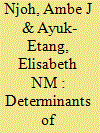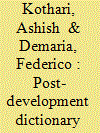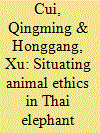|
|
|
Sort Order |
|
|
|
Items / Page
|
|
|
|
|
|
|
| Srl | Item |
| 1 |
ID:
182463


|
|
|
|
|
| Summary/Abstract |
This paper analyzes ecofeminism operationalized as the relationship between women and the natural environment. It treats ecofeminism as context-dependent and not a universal construct as suggested in the literature. It focuses on the political, economic, social, technological, ecological, cultural and historical (PESTECH) context of ecofeminism in Anglophone Cameroon, a polity with a unique pre-colonial, colonial and post-colonial experience. Each dimension is shown to impact women–nature relations in its own unique way. This underscores the need to be more discerning and attentive to context in any analysis of ecofeminism.
|
|
|
|
|
|
|
|
|
|
|
|
|
|
|
|
| 2 |
ID:
156646


|
|
|
|
|
| Summary/Abstract |
This article lays out both a critique of the oxymoron ‘sustainable development’, and the potential and nuances of a Post-Development agenda. We present ecological swaraj from India and Degrowth from Europe as two examples of alternatives to development. This gives a hint of the forthcoming book, provisionally titled The Post-Development Dictionary, that is meant to deepen and widen a research, dialogue and action agenda for activists, policymakers and scholars on a variety of worldviews and practices relating to our collective search for an ecologically wise and socially just world. This volume could be one base in the search for alternatives to United Nations’ 2030 Agenda for Sustainable Development, in an attempt to truly transform the world. In fact, it is an agenda towards the pluriverse: ‘a world where many worlds fit’, as the Zapatista say.
|
|
|
|
|
|
|
|
|
|
|
|
|
|
|
|
| 3 |
ID:
169137


|
|
|
|
|
| Summary/Abstract |
Following ethical contextualism, this article situates different animal ethical principles, from anthropocentrism to non‐anthropocentrism and relational caring ethics, in Thai social contexts in order to examine whether these principles can lead to a sustainable ethical practice in elephant conservation. The results show that, as non‐anthropocentrism, animal rights ethics are impractical in Thailand because of temporal, spatial, economic and social constraints. As weak anthropocentrism, animal welfare ethics endorse the tourism industry to commercialise the encounter value of elephants by developing elephant camps. Along with animal welfare, relational ecofeminism justifies the emerging model of elephant sanctuaries. Both camp and sanctuary models create a work‐for‐care cycle, in which elephants work to generate economic gains, some of which are in turn used to care for elephants. However, because of evolving social situations, such as potential market competition and poaching of wild elephants, the morality of the work‐for‐care cycle is weak and can be challenged. Nevertheless, sanctuaries offer a direction for a local solution because of their potentially responsible business model. In conclusion, there is not a single set of ethics that can solve all problems and be sustainable in all contexts.
|
|
|
|
|
|
|
|
|
|
|
|
|
|
|
|
|
|
|
|
|